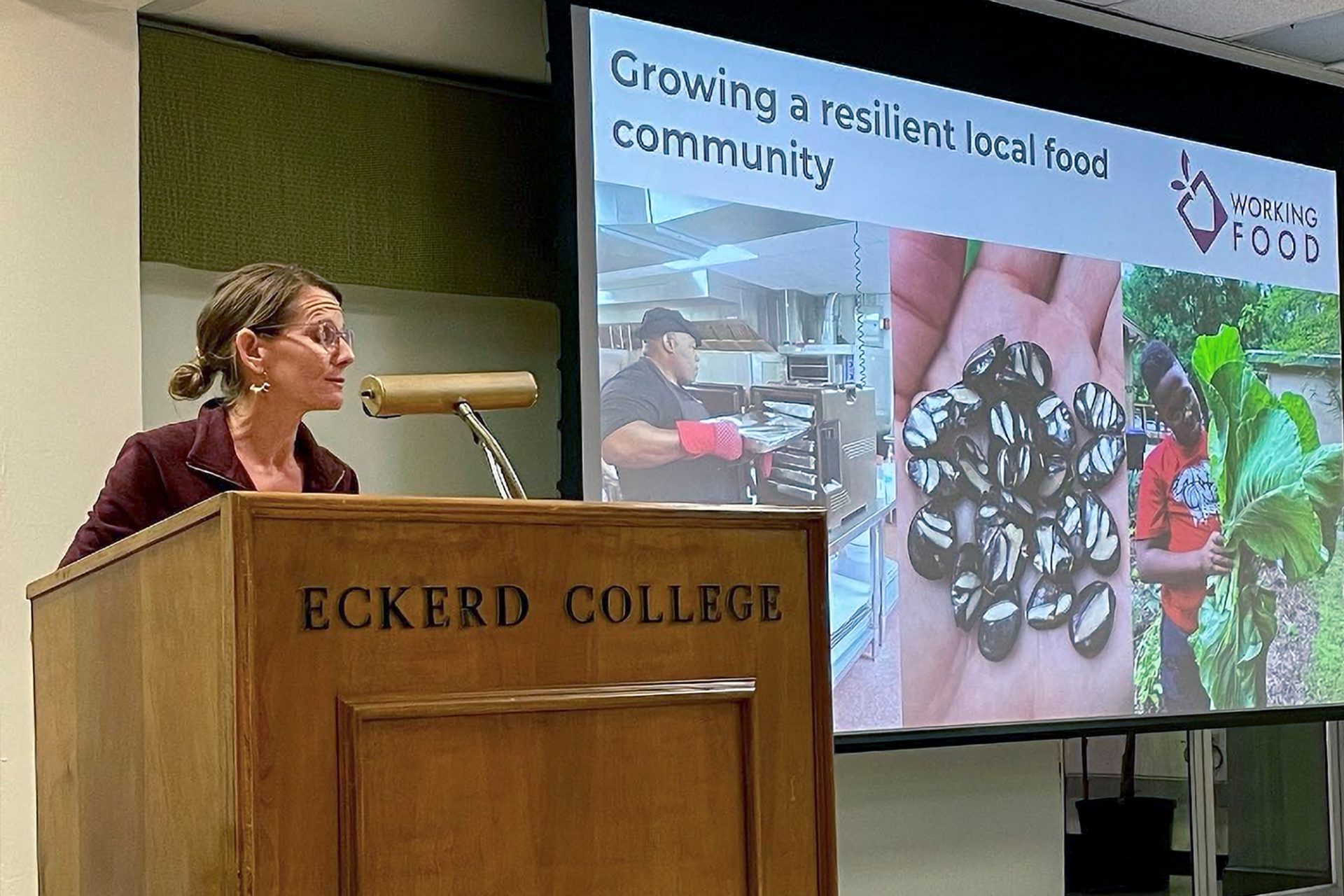When Working Food’s co-founder Melissa DeSa was growing her first Seminole pumpkins—a variety originally grown and cultivated by the Calusa, Creek and Miccosukee peoples—she realized only one company supplied the seeds.
DeSa told the story during her Nov. 8 visit to Eckerd College to teach students about her work building resilient food communities in North Central Florida and working within the nonprofit field.
She began to worry about how she would grow this vibrant vegetable without the ability to purchase more seeds. DeSa soon realized, though, that she had been throwing away her most sustainable resource: the pumpkin seeds. “We can save our own seeds,” she said, “and we don’t really have to depend on other people to save them for us.”
DeSa is the seed program director, or “Seed EO,” of Working Food, an organization cultivating and facilitating the growth of local food systems through “collaboration, economic opportunity, education and seed stewardship.” She has over a decade of experience in nonprofit management, community organizing and youth development programs.
Working Food uses three main areas of programming: seed, youth and kitchen. Its growing staff collect seeds, creating a seed bank for agricultural use and education. They also host youth education programs in their garden, teaching children about concepts such as pollination, ecology and environmental protection. Finally, they run a local kitchen, where small businesses can rent out space in their walk-in fridge and use kitchen equipment. DeSa emphasized, however, the importance of their work in the community, saying, “Education and outreach is really the most important work we do … It’s about the people and the connections. The ‘culture’ part in agriculture is people.”
Before DeSa co-founded Working Food, she worked as a biologist for Florida Organic Growers, the Florida Museum of Natural History, and the University of Florida Horticulture Department.
The Seminole pumpkin is a native Florida plant that has flourished here for centuries. It is a cultivated variety similar to squash or other varieties of pumpkin and is one of the tastiest, heartiest and most reliable vegetables grown in all of Florida.
She questioned, “What does it mean when white people like me are holding these seeds today,” considering whether it was right to preserve these varieties of plants whose original cultivators were systematically oppressed.
DeSa became fascinated with the interconnectedness of community, ecology, agriculture and food systems, asking questions like, “How do you actually have a long-lasting impact in our community?” and “What are we doing with the people in our community to help our local food systems?” It was from these questions that Working Food was born.
The Gainesville-based nonprofit has since grown, partnering with many local businesses and other organizations concerned with community-building and environmentalism. This collaboration, DeSa said, has been essential to Working Food’s growth, bringing to mind the proverb “If you want to go fast, you should go alone. If you want to go far, you should go together.”
DeSa concluded her talk with an emphasis on collectivism and community, explaining that her journey developing Working Food has also been a journey of self-discovery. “I’ve seen that people are the solution,” she said and ended with a quote from Robin Wall Kimmerer, author of the book Braiding Sweetgrass.
“‘If one tree fruits, they all fruit—there are no soloists. Not one tree in a grove, but the whole grove; not one grove in the forest, but every grove; all across the county and all across the state,’” DeSa conveyed. “‘The trees act not as individuals, but somehow as a collective. Exactly how they do this, we don’t yet know. But what we see is the power of unity. What happens to one happens to us all. We can starve together or feast together. All flourishing is mutual.’”













